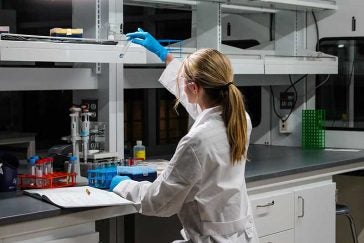
Prior to earning her PhD in 2019, Marisa Pfohl was a STEEP trainee with Dr. Angela Slitt, Project 3 co-lead, in the College of Pharmacy at the University of Rhode Island. As a trainee, Pfohl conducted research on the toxicity of PFAS, which have been linked to high blood cholesterol in humans. The role of PFAS in the increasing prevalence of diet-induced fatty liver disease, which affects roughly one quarter of all Americans, is not well understood. Pfohl’s work was focused on the effects of PFAS—in combination with an American diet—on changes in lipids and metabolic pathways. Further, PFAS have been associated with low fetal birth weight in human populations, and it was an aim of her research to characterize PFAS induced metabolic perturbations in early life to better understand these observed effects.

Pfohl is currently a postdoctoral fellow and toxicologist at the Environmental Protection Agency (EPA) in Durham, North Carolina, in the Office of Research and Development (ORD) where she works for the Center of Environmental Solutions and Emergency Response (CESER). Pfohl stated that “my experience with the STEEP superfund project and the skills I acquired during my time as a trainee helped prepare me for my new role at the EPA.” Her research focuses on the creation of detection methods to measure chemical concentrations in the Disaster Characterization Branch (DCB). These methods aid in understanding the effectiveness of decontamination and remediation efforts and help determine how to best approach the clean-up of an environmental spill or contaminated site. Pfohl also works for the Homeland Security Research Program (HSRP) where she is involved in risk assessment activities to inform emergency response following a chemical release.

